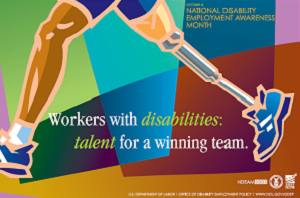
Today we finish our series on building an employer framework for managing disability accommodation processes under ADA/ADAAA. In the first installment, I covered the high level aspects and provided some key areas of focus. In the second blog, we shared suggestions for developing a written administrative process flow, including outlining specific roles and responsibilities.
Today's focus is on using specialty resources to reduce the administrative burden on the employer by supplying expertise in job accommodation and return to work, by coordinating some or all of the interactive process and by providing tracking and reporting of an employer's ADA claims and trends.
Identify specialty resources to support the ADA/ADAAA interactive and accommodation process. Development of a worksite accommodation can benefit from the specialty skills of a nurse case manager, a physical therapist, an ergonomist or a vocational counselor. Adding these skilled resources to the interactive evaluation process can really improve outcomes for the employee and the employer – ensuring the "right fit" for the job accommodation. These professionals can ease the increased administrative burden of the rising number of interactive processes being seen by employers under new laws and regulations, and can often serve a useful role in coordinating steps of the interactive process.
Specialty professionals have been used for many years in the workers' compensation arena. Their expertise with employees who have disabilities, including "hands on" worksite adaptation, adds valuable information to the accommodation process. Their expert knowledge enables the employer to make a well-informed decision as to whether a job accommodation is available and if it can be offered without undue hardship to the business.
In addition, these specialty professionals can work with a disabled employee after their return to work to:
- Ensure job accommodation design is working for both the employee and employer
- Help identify, along with the physician, if the employee's work capabilities are increasing, so that the job accommodation can be adjusted (this second function is very important if a temporary accommodation is being made and the employee is expected to have further recovery)
The use of specialty resources cannot take away the employer's responsibility of making the employment and accommodation decision under the law. But having high-quality job accommodation information to supplement the physician's clinical information can be a very valuable tool. Today, employers who outsource their claims or leave management are looking more often to their vendor partners as a resource for these specialty tasks. For many employers, it is just not possible to staff internally to meet increasing accommodation needs, considering the impact decisions can have on business operations long into the future. Using specialists can improve the efficiency and quality of the process.
The new ADA/ADAAA law and the revised EEOC regulations supporting it, as well as multimillion dollar judgments in the news, have raised employer awareness of the need to have a clear and compliant disability accommodation process that is well communicated and well executed throughout the organization. Being prepared with a detailed process, designed for efficiency and effectiveness – with the right stakeholders involved who understand their roles and responsibilities – has great value.
What questions or challenges are you facing in regard to ADA and disability accommodation? There is much more to learn, so stay tuned for future posts and, again, let me hear from you.
Denise Fleury, SVP, Disability and Absence Management